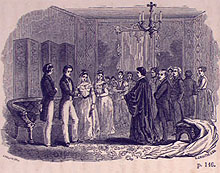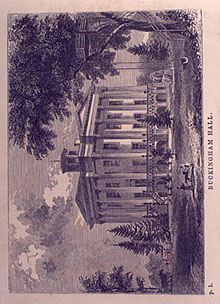Criswell's title page identifies him as a lawyer, and in the preface he says he
"liv[es] in the North," but he also says "he has travelled extensively through the South,
(having visited nine of the Southern States,) [and] therefore flatters himself that he
gives a fair and impartial statement of both sides of the question" of slavery. "Impartial"
means, however, that while acknowledging there are some cruel masters (mostly originally from the
North), his ultimate goal is to "modify [Stowe's account] somewhat, by representing the
Planter and Slave in a more favorable light."
|

The Bridal Party
The Clifton Waller Barrett Collection
|
In Chapter 12 his characters explicitly discuss the truthfulness of Uncle Tom's
Cabin, but unlike many "anti-Tom" novels Criswell essentially replaces Stowe's narrative with an
entirely different one -- one that anticipates the way the slave South will be re-presented by
novelists after slavery is abolished. Criswell's story is a love story, about a southern man
and a northern woman whose fathers forbid their marriage -- until the northerner sees firsthand that
most planters are loving masters and most slaves, contented dependents. There are no major black
characters; readers get to overhear a few slave conversations (mostly about their love lives,
and modeled on minstrel show routines), see slaves frolic after work, etc., but the emphasis on the
white lovers relegates the slaves to the story's background. There is no irony when Eugene
Buckingham, the hero, protests that he will never marry the neighboring woman his father has picked
out for him with these words: "Am I a slave? I will not submit to such
tyranny!"
|
Like many post-Civil War stories about the South, the narrative ends with a double-marriage
between southerners and northerners. In the late 19th century that ending was intended to symbolize the reunion
of the nation that had divided and fought over slavery. Criswell's dedication to Henry Clay
underscores the way his intention is to write a novel that will keep the nation from disunion. As
he puts it in his preface, the novel is meant "to be one drop of
oil cast upon the temptestous sea and agitation" aroused by Uncle Tom's
Cabin. Missing from this novel, then, is the sectional and ideological hostility or suspicion
one finds in most other "anti-Tom" fictions. Criswell can show his readers scenes the more
aggressive apologists for slavery omit, including a slave auction, and acknowledge some slaves do
suffer -- but finally, according to his fiction, there's nothing to keep North and South from getting
along.
"Uncle Tom's Cabin" Contrasted with
Buckingham Hall, the Planter's Home;
or, A Fair View of Both Sides of the Slavery Question.
By Robert Criswell, Esq. [illustrated]
(New York: D. Fanshaw, 1852)
Digital text prepared with the help of the
Wright American Fiction Project, Indiana University Library.
|


